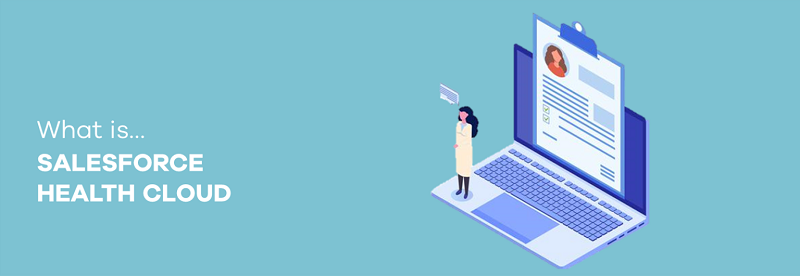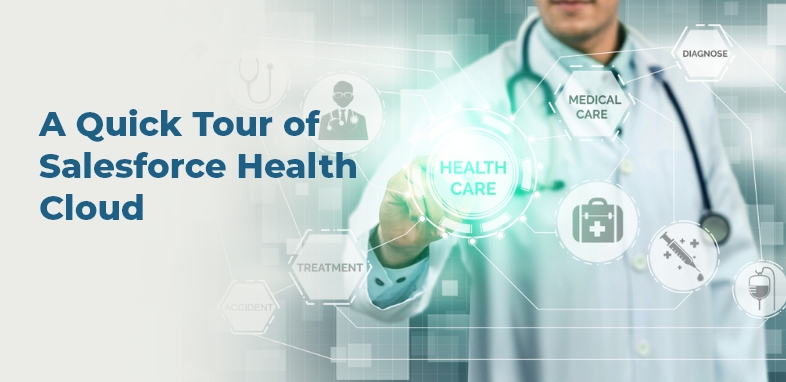The health sector is actually one of the largest in the world; in 2019, it generated 282 billion dollars in revenue, and by 2027, it is predicted to grow at a CAGR of 7.9%. Healthcare services have been impacted by the conventional method of doing things, however, in the contemporary day, healthcare is moving toward a more patient-centric approach. This surely helps in building patient satisfaction, providing high-quality healthcare, reducing needless expenses, and enhancing better outcomes. In spite of this, healthcare providers today face challenges as they attempt to transform from legacy systems to 1-to-1, smart, and connected care.
However, the latest solutions are focusing on future business in the healthcare industry where they can leverage out-of-the-box, customizable and extensible facilities for their customers bringing more attention to consumers. A healthcare organization’s ability to personalize the consumer experience at every stage requires connecting teams, automating processes, upgrading clinical systems, and securing business data. Therefore, health cloud technology, specifically Salesforce Health Cloud, has revolutionized healthcare delivery.

What is Salesforce Health Cloud?
Health Cloud is a cloud-based CRM (Customer Relations Management) system for healthcare. Using a centralized system, it connects all related entities, including healthcare providers, Medtech, pharmaceutical companies, and the government.
A cloud-based healthcare software platform built on the Salesforce CRM platform covers all healthcare industry needs. It enables healthcare and life sciences professionals to research, triage, diagnose, plan, deliver, and monitor care digitally. As a result, the health Cloud is the most suitable solution for all issues facing the healthcare industry today. A large number of tech-savvy patients are also engaged as a result of one-to-one relationship management.
According to research by Salesforce, More than 70% of millennials choose doctors who use technology in health care; 63% expect to share health data through wearables.
Salesforce developed the Salesforce health cloud, which was released in 2016, in collaboration with Accenture, Deloitte, MuleSoft, Persistence, Phillips, and PwC. With this innovation, many healthcare organizations were able to turn challenges into opportunities by utilizing them and also developed capabilities that matched industry trends. With this Health IT CRM solution, doctors and patients can manage their relationships through personalized engagements and records efficiently to reduce costs and improve customer service. Through it, healthcare shifts from a medical record-centric approach to a patient-centric approach, providing a complete picture of patients on a single, unified platform.
It helped combine non-clinical and clinical data of customers to drive efficiencies in healthcare by
- Maximizing sales and service excellence by putting the customer first
- Increasing productivity by automating processes and collaborating across teams
- Providing a secure and configurable platform for innovation
“71% of millennials expect to use mobile apps to manage their healthcare, yet most healthcare systems aren’t equipped to provide this option.”
- Salesforce “State of the Connected Patient” Report, 2015
Primary Features of Salesforce Health Cloud
A Complete View of the Patient
- Develop patient profiles that are contextual and rich in information.
- Obtain information about collaborative care networks and health timelines.
- Streamline the integration of patient data from the electronic health record (EHR).
- Integrate medical device and wearable data When you have an overview of the patient,
you can easily access relevant information such as his or her current condition, medications, appointment history, and communication preferences.
Salesforce Health Cloud syncs with the EHRs in your healthcare system to make patient data accessible, usable, and up-to-date on any device. Additionally, you can collect information from at-home devices, like glucose levels, sleep patterns, and activity metrics, thanks to the direct integration of medical devices and wearables with Salesforce Health Cloud.
Salesforce Health Cloud EHR Integration:
Electronic Health Records (EHR), are the digitalized version of patient charts. Medical health organizations prefer these over other means of recording patient data.
EHR also usually provides essential, additional services using saved data such as treatment plans, medication schedules and records, medical history, diagnoses, test results, radiology immunization records, allergies, and radiology images.
All major health cloud-using hospitals are carrying out mass EHR device integrations to digitalize the tedious process of creating and maintaining patient charts and records. The digitalization of the process also removes the chances of human error and the accidental negligence of critical information during chart evaluations.
Salesforce health cloud EHR device integration synchronizes patient data with all the medical records present in the cloud system.
The integration of the Salesforce health cloud with the EHR also results in all the information being updated and analyzed in real time.
Get Smart with Customized Care Plans
Healthcare providers can use Salesforce Health Cloud to:
- Prioritize tasks for all patients’ needs
- Manage patient groups based on segmentation
- Establish a network of personal and professional caregivers
- Personalised care is provided by managing multiple care plans, custom goals, problems, and tasks.
An integrated picture of your patients and the most important tasks pertaining to your whole patient population is provided via the “Today” tab in Salesforce Health Cloud. By reading the personalized care plan for tasks and taking swift action on them using the Today view, you may make care decisions more effectively.
Additionally, you can manage patient populations by segmenting them, for example by sending a secure, private message to all patients with high blood pressure to set up regular check-ins.
Interactive Patient Engagement
Healthcare information is more easily accessible with Salesforce Health Cloud, improving workflows and care outcomes:
- Efficient and effective interaction with care teams and patients
- Comprehensive caregiver networks
- Messages to any devices can be shared securely
Care coordinators may securely collaborate and assign tasks across the caregiver network with the help of Salesforce Health Cloud. The entire healthcare system benefits from this, as you can engage with patients to track progress toward care plans or health objectives, interact effectively with doctors, care coordinators, and family members, and rapidly find answers from specialists within the provider network.
Additionally, you can address patients’ demands for convenient communication by expanding Salesforce Health Cloud to mobile platforms. This will also encourage greater engagement and accountability as well as the growth of stronger bonds and loyalty.
Health cloud provides a facility to store health insurance details where we can display the net deductible amount and net payable amounts of patient bills.
Conclusion
In order to meet the demands of today’s connected patients, modern healthcare systems must rapidly evolve. In order to put the patient at the center of care, Salesforce Health could provide caregivers with the following core advantages:
- Streamline scheduling for your patients, members, and employees to improve team productivity and customer engagement.
- Integrate data from EHRs, wearables, and more to get a complete picture of the patient.
- Utilize a single console for smarter care decisions
- Communicate with patients on any device and across caregiver networks using social media Salesforce Health Cloud has also been recognized as a leading healthcare CRM for providers by Forrester Wave, a guide to the emerging technology market. Salesforce health cloud is trusted by healthcare provider organizations regardless of their size.
It helps to make the most of the technology by using Salesforce’s health cloud platform. Cloud technology is being integrated into existing technology infrastructures in healthcare organizations, and it is also being configured according to the needs of hospitals, clinics, and healthcare providers. There are also tailored apps available.
If you’re looking for a salesforce health cloud provider, Vyom Labs can help with our industry-leading salesforce health cloud services and solid solutions with its team of certified health cloud specialists. In addition to customization, salesforce integration services, app development, and other services,
Vyom Labs, a reputable salesforce partner, also offers the best-in-class salesforce consulting services. We offer top-notch salesforce health cloud services and develop a health cloud that is unmatched.
About the Author:
 Beena Dhage
Beena Dhage
Customer Experience (CRM) enthusiast with expertise in providing solutions leveraging digital and cloud technologies. With forte in Customer Service, BMC Remedyforce Services Delivery and ITIL.
Beena Dhage has over 18+ years in the field of IT – focused on implementing, managing, and supporting Salesforce CRM and ITIL-based ITSM applications. She has vast experience of successfully delivering projects in multi-shore / location environment for customers across various verticals including Financial services, Retail, Manufacturing and Information Technology
